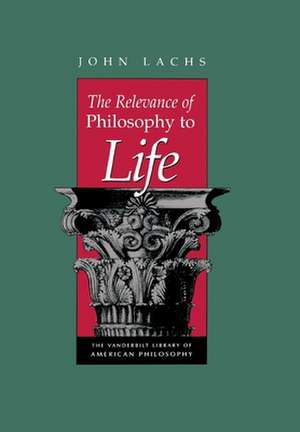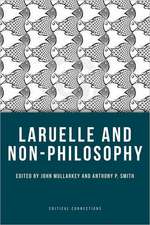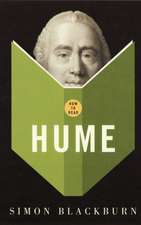The Relevance of Philosophy to Life: Vanderbilt Library of American Philosophy (Hardcover)
Autor John Lachsen Limba Engleză Hardback – 31 mar 1995
Din seria Vanderbilt Library of American Philosophy (Hardcover)
-
 Preț: 281.20 lei
Preț: 281.20 lei - 23%
 Preț: 588.36 lei
Preț: 588.36 lei - 23%
 Preț: 593.13 lei
Preț: 593.13 lei - 23%
 Preț: 477.87 lei
Preț: 477.87 lei - 23%
 Preț: 475.36 lei
Preț: 475.36 lei - 23%
 Preț: 480.51 lei
Preț: 480.51 lei - 23%
 Preț: 473.13 lei
Preț: 473.13 lei - 23%
 Preț: 476.98 lei
Preț: 476.98 lei - 23%
 Preț: 480.51 lei
Preț: 480.51 lei - 23%
 Preț: 480.81 lei
Preț: 480.81 lei - 23%
 Preț: 476.83 lei
Preț: 476.83 lei - 23%
 Preț: 470.16 lei
Preț: 470.16 lei - 23%
 Preț: 478.45 lei
Preț: 478.45 lei - 23%
 Preț: 590.91 lei
Preț: 590.91 lei - 23%
 Preț: 471.20 lei
Preț: 471.20 lei
Preț: 322.70 lei
Nou
Puncte Express: 484
Preț estimativ în valută:
61.75€ • 66.03$ • 51.48£
61.75€ • 66.03$ • 51.48£
Carte tipărită la comandă
Livrare economică 17 aprilie-01 mai
Preluare comenzi: 021 569.72.76
Specificații
ISBN-13: 9780826512628
ISBN-10: 0826512623
Pagini: 296
Dimensiuni: 160 x 235 x 25 mm
Greutate: 0.66 kg
Ediția:New.
Editura: Vanderbilt University Press
Seria Vanderbilt Library of American Philosophy (Hardcover)
ISBN-10: 0826512623
Pagini: 296
Dimensiuni: 160 x 235 x 25 mm
Greutate: 0.66 kg
Ediția:New.
Editura: Vanderbilt University Press
Seria Vanderbilt Library of American Philosophy (Hardcover)
Textul de pe ultima copertă
The primary purpose of philosophy is to help us better understand the critical issues in life. Sadly, in this modern world we often relegate philosophy to the ivory tower and to dusty tomes forgotten on the library shelf. With The Relevance of Philosophy to Life, eminent American philosopher John Lachs reminds us that philosophy is not merely a remote subject of academic research and discourse, but an ever-changing field which can help us navigate through some of the chaos of late twentieth-century living. Utilizing an American pragmatism grounded in the works of Dewey, James, and Santayana, Lachs insists on both the personal and the social significance of philosophy. Tackling controversial topics such as dogmatism, the relativity of values, resuscitation, euthanasia, the right to die, violence, education, technological advancement and dominance, and individual integrity in bureaucratic structures, Lachs argues that value is relative to human nature and that human nature is not one but many "human natures". He sheds light on complicated issues in a way that informs the most sophisticated reader while also making the issues, his reasoning, and his solutions accessible to the general public. This important new book challenges readers to apply ethical principles and philosophical understanding more consistently in their own lives. It will be a timely addition to the libraries and reading lists of many professionals, students, and individuals seeking a fuller appreciation of philosophy's relevance to our own times.


















